2018届高考英语北师大版一轮复习教案:选修8 Unit 24 Society含解析
高考英语北师大一轮课件:选修8 预习案 Unit 24 Society
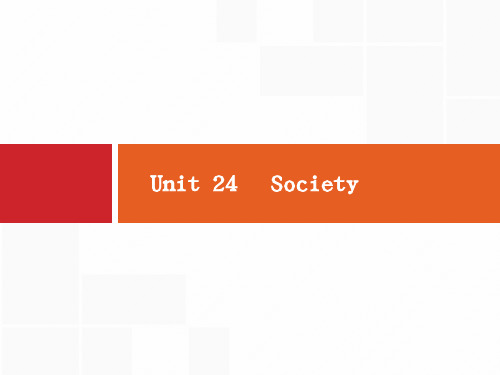
选修8
Unit 24 Society
考纲单词
常用短语
adjustment n. 调整,调节 mutton n. 羊肉 brunch n. 早午餐 buffet n. 自助餐 bare adj. 赤裸的 pension n. 退休金,养老金 resign vt.& vi.辞职 pregnant adj. 怀孕的 choke vi.窒息;噎住 delete vt.删除 shrink vi. (使)收缩,缩小 virtue n. 优点,长处 feast n. 盛宴,宴会
Unit 24 Society
选修8
Unit 24 Society
考纲单词
常用短语
重点句型
话题语篇演练
-2-
必背表达单词——写作信手拈来
homelessness n. 无家可归 inequalityn. 不平等 voluntary adj. 自愿的 abundant adj. 大量的 deposit vt.& vi.存储,储蓄 currency n. 货币 govern vt.统治,管理 accumulate v. 积累 ownership n. 所有权 burden n. 负担;重担 rag n. 破旧衣服 vacant adj. 未住人的;空置的
选修8
Unit 24 Society
考纲单词
常用短语
重点句型
话题语篇演练
-12 -
『构织连脉词族』
1 .equal adj. 平等的→unequal adj. 不平等的→equality n. 平 等→inequality n. 不平等→equally adv. 平等地→unequally adv. 不平等地 2 .volunteer vi.自愿 n . 志愿者→voluntary adj. 志愿的 3 .abundant adj. 大量的→abundantly adv. 大量地 →abundance n. 丰富,充足 4 .govern vt.统治→government n. 统治→governor n. 省长
2018_2019学年高考英语一轮复习unit24society讲义北师大版选修8
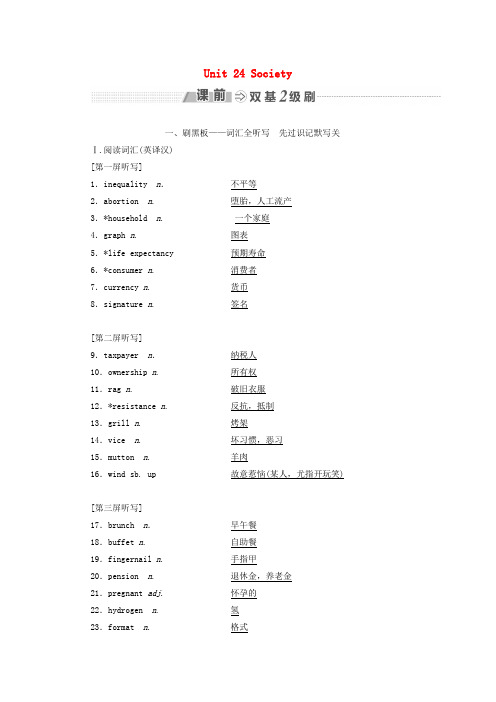
Unit 24 Society一、刷黑板——词汇全听写先过识记默写关Ⅰ.阅读词汇(英译汉)[第一屏听写]1.inequality n.不平等2.abortion n. 堕胎,人工流产3.*household n. 一个家庭4.graph n. 图表5.*life expectancy 预期寿命6.*consumer n. 消费者7.currency n. 货币8.signature n. 签名[第二屏听写]9.taxpayer n.纳税人10.ownership n. 所有权11.rag n. 破旧衣服12.*resistance n. 反抗,抵制13.grill n. 烤架14.vice n. 坏习惯,恶习15.mutton n. 羊肉16.wind sb. up 故意惹恼(某人,尤指开玩笑)[第三屏听写]17.brunch n.早午餐18.buffet n. 自助餐19.fingernail n. 手指甲20.pension n. 退休金,养老金21.pregnant adj. 怀孕的22.hydrogen n. 氢23.format n. 格式24.*leisure n. 闲暇,空闲25.framework n. 结构,构架[第四屏听写]26.feast n.盛宴,宴会27.surplus n. 盈余,剩余28.sow vt. & vi. 播(种) 29.roundabout n. 环岛,环形交叉路口30.collision n. 相撞31.weed n. 杂草,野草32.fountain n. 喷泉,喷水池33.paddle vi. & vt划水;涉水34.wag vt. 摇摆,摆动[第五屏听写]35.packet n.小盒36.grocer n. 食品杂货商37.league n. 联合会38.ministry n. 部39.poster n. 海报40.edition n. 版本[第六屏听写]41.alley n.胡同,小巷42.rectangular adj. 长方形的43.mop n. 拖把44.fragrant adj. 有香味的45.*preservation n. 维护,保存46.arch n. 拱顶47.container n. 容器[第七屏听写]48.relay vt. 转达;传送49.spoonful n. 一匙之量50.*robbery n. 抢劫51.*rape n. 强奸52.*shoplifting n. 在商店盗窃53.*penalty n. 刑罚,惩罚54.*revenge n. 复仇,报复[第八屏听写]55.anchor n.锚56.*seaweed n. 海草,海藻57.swing vi. 摇动58.seagull n. 海鸥59.spiritual adj. 宗教的,教会的;精神的60.prayer n. 祈祷,祷告61.merchant n. 商人[第九屏听写]62.wax n.蜡63.pan n. 锅,平底锅64.semicircle n. 半圆(形)65.suck vt. 含在嘴里吮食66.bare adj. 赤裸的67.*utopia n. 乌托邦,理想中的完美社会68.Buddhism n. 佛教Ⅱ.高频词汇(汉译英)[第十屏听写]1.homelessness n.无家可归2.voluntary adj. 自愿的3.abundant adj. 大量的4.deposit vt. & vi. 存储,储蓄5.govern vt. 统治,管理6.accumulate v. 积累7.burden n. 重担,负担8.diverse_adj. 各种各样的9.come_into_being 形成,存在[第十一屏听写]10.adjustment n.调整,调节11.resign vt. & vi. 辞职12.delete vt. 删除13.shrink vi. (使)收缩,缩小14.show_off 炫耀,夸耀15.elect vt. 选举,推选16.merciful adj. 宽大的,仁慈的17.knock_into_sb. 撞上某人18.turning_point_ 转折点[第十二屏听写]19.undertake vt. 着手做,从事20.squeeze vt. 挤21.thirst n. 口渴22.break_into_ 闯入23.fine n. 罚款24.sentence n. 判决25.abolish vt. 废除26.on_principle_ 根据原则27.sentence_sb._to_death 判某人死刑[第十三屏听写]28.*furthermore adv. 此外,而且29.consequently adv. 所以,因此30.vacant adj. 未住人的,空置的31.choke vi. 窒息,噎住32.virtue n. 优点,长处33.rot vt. & vi. 腐烂34.skip vt. 跳过35.cast vt. 投下36.*moreover adv. 再者,此外二、刷清单——热身自盘点再过基本应用关(一)核心单词(四)初中考点再回顾一、过重点单词——纵引横联超人一点1.burden n .负担,重担 vt .(使)担负(沉重或艰难的任务、职责等)[教材原句] Instead, they feel like a burden because every month we have to hand over most of the money we earn to pay for them.相反,它们就像一种负担,因为我们每月都要将挣来的大部分钱拿出来支付贷款。
【一轮复习】高考英语(北师大版)一轮复习选修8 Unit 24 Society
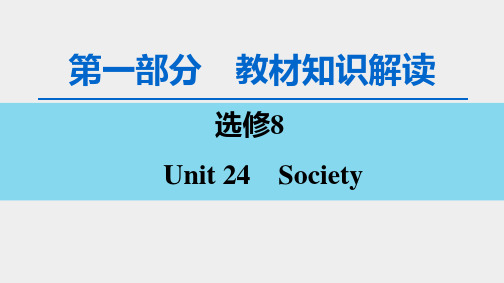
18
答案 栏目导航
19
[语境运用] 选用左边短语的适当形式填空 After giving birth to a second baby, my friend told me that her life
⑥_w_a_s not _b_e_tt_e_r_o_ff___.Her daughter often ⑦_b_r_o_k_e_i_n_to__ her younger brother's bedroom and hit him.It was obvious that she ⑧_w_i_n_d_ed_ him u_p_, which made her angry.But I think ⑨_o_n__p_ri_n_c_ip_l_e__, it was she that should be responsible for this.So I advised her to ⑩_ta_k_e_ it _s_e_ri_o_u_s_ly__ and ⑪__k_e_ep__a_n_e_y_e_o_n__ her daughter in daily life.
答案 栏目导航
阅读词汇
1.inequality n.不__平__等________ 2.graph n.__图__表_______ 3.deposit vt.___存__储__,__储__蓄__ 4.currency n.货__币_____ 5.vacant adj. __未__住__人__的__,__空__置__的_____ 6.pension n._退__休_金__,__养__老__金__ 7.leisure n._闲__暇__,__空__闲____
答案 栏目导航
拓展联想 1.“do”短语荟萃 ①do away with 废除;摆脱 ②do harm to 对……有害 ③do one's best 尽力 ④do one's duty 尽职责 ⑤do up 重新装修 ⑥do without 不用
北师大版高中英语选修八unit 24《society》the seventh period speaking优秀教案(重点资料).doc

安徽省滁州市第二中学高中英语 Unit 24 Society The Seventh Period Speaking教案北师大版选修8Teaching goals 教学目标1. Target language 目标语言a. 重点词汇和短语anchor, seaweed, swing, seagull, spiritual, buddhism, prayer, merchant, wax, pan, semicircle, suck, rob, steal, assist, attend, comprehensive, understanding, contamination, pollution, nervous, pass, spend, foreigner, earn, win, flourishing magnificent, essential, major, vital, concern, uneasy, ideal, utopian, carry on, go on, follow, continue, murder, rape, fraud, mugging, penalty, assault, blackmail, fine, burglary, age, comedy, drama, lend, poet, tragedy, period, shopliftingb. 重点句型That’s a good idea.Surely, it’d be better to explore a bit?OK, let’s do it.Don’t you think it would be better near the stream?How come?I wouldn’t mind one.Right. I’ll collect the stones…OK. Why don’t we both do that?It’s freezing.My feet are blocks of ice.I’m dying for a cup of coffee.I suppose he is getting on a bit.2. Ability goals 能力目标Enable students to make proper reactions to suggestions in communication.Enable students to use exaggeration in speaking.3. Learning ability goals 学能目标Help students learn how to prepare for problem solving task. Teaching important and difficult points 教学重难点Speaking strategy: prepare for problem solving.Teaching methods 教学方法Listening, speaking and discussing.Teaching aids 教具准备A multi-computer, a recorder.Teaching procedures & ways 教学过程及方式Step I RevisionCheck the homework.Check answers to Ex 1 with the whole class.Check answers to Ex 2 by having individuals write their sentences on the board.Check answers to Ex 3, 4 and 5 by asking individuals to tell out their answers, and then check together.Suggested answers to Ex 4:Debbie and Lily went on holiday to Beijing. First, they toured the Great Wall. Second, they walked through some hutongs. They then visited the Forbidden City. After that, they shopped and had a meal. They left the next day.Step II Listening: A songRead out the instructions to the class.Students work in groups of three or four, discussing the generation differences. Apart from differences, ask the class if there are any similarities between the two generations.T: We are very familiar with “the generation gap”. It’s said that there are differences between the children’s generation and their parents’ generation. Parents can not understand the children and can not be understood by the children. So a gap appears, though they live together. Now work in groups of three or four, discussing the generation differences. Think about these things: (Show a)…b)… c)… on the PowerPoint). Later, I’ll ask some groups to report your results to the class.…S1: As to tastes in music, most parents enjoy classical music or folk music, while the young prefer pop music. As for clothes, the young prefer fashion. They would more like to present their individual character through their clothes.S2: As to the attitudes to work and money, most young people seeka higher salary and changes. They may not like to stayunchangeable. But the parents would like to be stable.S3: As to marriage, most parents prefer their children to marry early and live with them, while the young hope to have his own life first and live independently after their marriage.T: So many differences! But I think there are surely similarities between the young and the parents, don’t you think so?S4: Yes. Though there are differences between the two generations, there are also something similar between them. For example, we can see both the young and the old in some sports games.…T: Good. So I think this gap can be filled if there are more understanding and acceptance.Deal with Ex 2Give students time to read the sentences before playing the cassette. Play the c assette twice for students to listen and find out who said each sentence.T: Have you ever listen to the song “Father and son” by Cat Steven? Ss: Yes / No.T: On Page 41, in Ex 2, there are fourteen sentences from the song. Now read the sentences and guess who said these things, the father or the son. Then I will play the cassette for you to check if you guesses are correct.Check the answers with the class as a whole.Deal with Ex 3Read out the questions to the class. Play the cassette again for students to experience the feelings of the father and the son. Discuss these answers to the question in pairs or groups of three. Tell them there are not “right” or “wrong” answers to the questions. They need to interpret the song and the feelings of the father and son.Suggested answers:1. The situation is that: the son wants to change his present situation and go away while the father asks him to get married and se ttle down. The son wants to go away because he doesn’t want to listen to his father’s old story and want to have his own life.2. The father advises his son to get married and settle down.3. The father may feel bad. The son may feel boring.Step III Speaking: Problem SolvingDeal with Ex 1Have students look at the photo and talk about it.Read the instructions to the class. As a whole class, students discuss what they would miss most in this situation.T: Look at the picture. Where are the three young people? Why are they there? What are they doing?S: In my opinion, they are in the wild. Maybe they are undertaking a camp and field training. Now they are discussing which road to take next.T: If you had to spend two weeks hiking on a mountain without any of the comforts of home, what would you miss most?Ss: Hot water, bread, fire …Deal with Ex 2T: In pairs, please discuss what would be the biggest survival problems for you?Deal with Ex 3&4Listen to three people on a survival course. Then say which of the problems in Exercise 2 are mentioned. Check students’ answers by playing the cassette again, pausing it after each answer.When dealing with Ex 4, give students time to read the expressions before play the tape again.T: Now, please read the expressions first. The expressions a-h are spoken immediately after the expressions 1-8. Each pair express the same meaning, but in quite different way. While listening, please match the expressions.Play the tape. Then check the answers.T: Then, please discuss which expressions involve exaggeration and which involve understatements.A sample discussion:S1: I think the expressions: 1 2 3 f 5 6 a d are exaggeration while the rest are understatements.S2: Yes. We also use such expressions a lot in Chinese.T: Listen to the tape again, pay attention to the reactions to suggestions. Let’s begin.After listeningT: Who’d like to read out the negative reactions to the class? S: Let’s me try. These negative reactions are:Surely, it’d be better to explore a bit.It’s quite big, but I don’t see why we have to build it near here.Don’t you think it would be better near the stream?Surely, we can do that when it’s finished.T: Good. Then turn to Page 90, try to finish Ex 1. Look at the pictures and complete what the people are saying, using idiomatic expressions.Check the answers by having individuals read out their sentences. T: Who’d like to read out your sentences for the first picture? S1: Let me try. It’s freezing in here.T: Right. What’s the second one?S2: Yes, my feet are blocks of ice.T: Then the third one?S3: I’m dying for a cup of coffee.T: Right. What about the fourth one?S4: If you’re homeless you can’t get a job; if you can’t get a job, you can’t pay rent. It’s a vicious circle.T: Good. What about the last one?S5: House prices have rocketed this year.T: Good. You’ve all done a good job.Step IV PronunciationDeal with Ex 6Play the cassette two or three times for students to listen to the words said slowly, then fast.Ask students to repeat the phrases after the cassette.T: Now listen to the tape first, please identity which of these sounds disappear or are added: /t/, /d/, /r/, /v/. Then repeat the phrases after the cassette.Answers:1 start-/t/ disappears2 let’s-/t/ disappears3 explore-add /r/ at end of “explore”4 best place-/t/ disappears5 for a cup-add /r/ at end of “for”6 cup of coffee-/v/ disappears, just schwa7 could build-/d/ disappears 8 need people-/d/ disappears9 some of them-/v/disappears 10 before it-add/r/ at end of “before”Step V Speaking strategiesStudents will be asked to make group decisions about how to survive in the wild, following the stages below.Stage 1Read the speaking strategies to the class and explain that they are going to follow these strategies in the next stages.Read out the instructions to the class and check that students understand any new vocabulary, e.g.: “fish hooks”.Stage 2Give students time to look back at the expressions in Function File on Page 37 and Chatroom on Page 42. In groups of three, students practice making suggestions and reacting to them.Stage 3In their groups, students identify the most important problems, suggest and agree solutions and decide how to share the jobs. T: Now, if you are asked to spend two weeks in a forest in groups of three, what do you do to survive in the wild? … Please first read the speaking strategies for preparing for problem solving. Because you are asked to follow these strategies in the next stages.Students read the strategy silently.T: OK, let’s look at the task information; discuss them with your partner. Next, you have several minutes to look back at the expressions in Function File on Page 37 and Chatroom on Page 42. Please think of suggestions to help you survive and work in group of three, practice making and reacting to suggestions. Then, you should identify the most important problems, suggest and agree solutions and decide how to share the jobs.T: OK, now imagine you are in the wild. Please make your plan to survive.A sample of the dialogue:A: OK, so here we are. We must survive for two weeks in the forest, but we have only the equipment-knife, fish hooks, torch, flint, first aid kit, cooking pan, water bottle, and food for one day. B: Yes.C: I think the most important problem is to get a shelter built.It’s colder in the night and we also need to protect ourselves from dangerous animals.A: That’s a good idea.B: Surely, it’d be better to explore a bit? We should find the best place.C: OK, let’s do that.C: OK, let’s start, shall we?A: Good, I’ll collect some stones and make the wall for the shelter.And we need people to cut branches.B: OK, why don’t we both do that?C: I’d rather you cut the branches. I’ll carry them and let’s put some of them on the ground to sleep on.B: Surely. Let’s get going. And then we can make a fire to make something to eat.Step VI TalkbackIn turn, each group tells the class their plan to survive.The class then votes for the group with the best chance of surviving.Step VII HomeworkFinish the unfinished exercises on Pages 90 and 91.*。
大一轮高考总复习英语(北师大版)课件:Unit+24 Society(选修八)
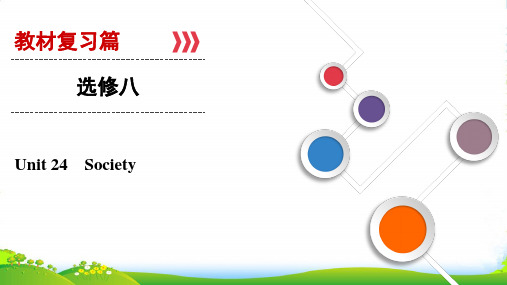
(二) 阅读单词识记 1.rag n._____破__旧__衣__服_____ 2.virtue n.___优__点__,__长__处______ 3.skip vt.____跳__过______ 4.swing vi.__摇__动________ 5.deposit vt.&vi.__存__储__,__储__蓄_______ 6.delete vt.__删__除________ 7.shrink vi.____(_使__) _收__缩__,__缩__小____________
(三) 核心单词拓展 1.voluntary (adj.) 自愿的→___v_o_l_u_n_te_e_r___ (v.) 自愿做→____v_o_lu_n_t_e_e_r__ (n.) 志 愿者 2.consequently (adv.) 所以,因此→___c_o_n_s_eq_u_e_n_t___ (adj.) 作为结果的 3.signature (n.) 签名→___s_ig_n___ (v.) 签名;打手势 (n.) 招牌;迹象;符号 4.govern (vt.) 统治,管理→__g_o_v_e_r_n_o_r___ (n.) 统治者,总督→__g_o_v_e_r_n_m_e_n_t___ (n.) 政府 5.adjustment (n.) 调整,调节→___a_d_ju_s_t___ (vt.) 调整,调节,使适应 6.diverse (adj.) 各种各样的→___d_i_v_e_r_si_ty____ (n.) 多样性,差异 7.resign (vt.& vi.) 辞职→___r_e_si_g_n_a_ti_o_n____ (n.) 辞职
栏 目 导 航
01 自主核查·基础盘点 02 师生互动·核心突破 03 随堂演练·效果巩固 04 课后练习·稳基提能
北师大版高中英语选修八unit 24《society》the sixth period writing优秀教案(重点资料).doc

安徽省滁州市第二中学高中英语 Unit 24 Society The Sixth PeriodWriting教案北师大版选修8Teaching goals 教学目标1. Target language 目标语言a. 重点词汇和短语break into, fine, sentence, abolish, on principle, sentence sb. to death, consequently, due to, as a result of, in order to, moreover, furthermoreb. 重点句子What is even more unbelievable is the fact that some murderers are let out of prison after three or four years.I think we should bring back much harder sentences in this country …I also believe we should bring the death penalty back to this country as in the States.I am totally against harder sentences on principle and really feel the death penalty should be abolished.2. Ability goals 能力目标Learn to write a discursive essay.3. Learning ability goals 学能目标Enable students to know how to write a discursive essay.Teaching important and difficult points 教学重难点Enable students to know how to write a discursive essay. Teaching methods 教学方法Asking and answering; pair work.Teaching aids 教具准备A multi-computer.Teaching procedures & ways 教学过程及方式Step I Revision and leading inCheck the homework to the vocabulary exercises.T: The topic of this unit is “Society”. Who would like to say something about what we have learned in this unit up to now? S: In the first period we have learned something about the social problems of England. From lesson 1, we learned about the consumer society. And we should remember that “being” and “doing” are much more important than “having”. From lesson 2, we learned about the western ideal society Utopia. From lesson 3, we learn about the cultu re of Beijing’s Hutongs —its past and present. …T: Good! To learn the language of English well, we should learn the social culture as well. Try to learn about the differences between cultures.Punishment: the death penalty, fine, prison sentence, soft/hard sentences, life sentenceSs: (repeat)T: Well, please work in pairs, discussing which of the crimes are a big problem in our own society? What punishments would you give for the crimes? You can check the meanings of the key words in the vocabulary list before your discussion.A sample:S1: I think break in is the biggest problem now. I’ve heard of a few cases of break in recently. The criminals broken in and shot two office workers to death.S2: Yes. It’s very horrid. I think the criminals should be given hard sentence.Deal with Ex 2Ask students to work individually first, then discuss with the whole class.T: I’m glad you have had a heated discussion. Next, read the two letters to a newspaper on Page 40. From the title and the photo we can know the two letters are both about crime and punishment. But they hold different ideas. First read individually and decide which one you agree with most.After six minutesLet students talk about their opinions.S3: I agree with the first letter. I think criminals should pay for what they have done. And they shouldn’t be let off with fines.When a person has killed somebody, they don’t deserve to live. S4: I agree with the second one. I think every person is good by nature. And the primary goal of punishment should be to reform the person who has committed the crime. We need to help and reform criminals in order to make them into useful members of the community.S5: Yes. We should give opportunities to those who would like to repent. And the death penalty is a cruel form of punishment which is against human dignity.S6: I agree with the first one. If a drug dealer or robber can be out on the streets only a few weeks or months after committing their crimes, or even get let off with fines, they would be dangerous and our community would be at risk then.S7: Yes, as a result, many people will lose faith in justice.Step III PracticeT: Well, from the two letters, we know something about the crime and punishment in Britain and the USA. Next, let’s do Ex 3 on Page 41. The sentences (1-8) are from a discursive essay, and they are not as personal as the opinions in the two letters. Now what you should do is to match the sentences with personal opinion in the two letters. You can work in pairs.Check the answer by asking individual students to read out their answers.Suggested answers:1 I think we should bring back much harder sentences.2 I totally agree with the American idea of “three strikes and out”.3 They have become like luxury hotels with televisions and gyms.4 I also believe we should restore capital punishment in this country.5 We also need to think about the wishes of the families and friends.6 I am totally against harder sentences on principle.7 Capital punishment is judicial murder.8 It is a savage form of punishment which is against human dignity. Deal with Ex 4.T: Look at the linking words. Which introduce reason and which introduce result?Ss: Consequently, so that, as a result of introduce result; while due to, just because, so much and in order to introduce reason. Then students do the exercise individually. Then compare answers in pairs before checking answers as a class.Check students’answers by having individuals read out their answers.Step Ⅳ WritingStudents will be asked to write an essay discussing the statement: The only way to cut crime in our country is to make punishment more severe.First teacher should explain the stages of writing a discursive essay. Students are given time to discuss. Students can work in pairs, listing the arguments for and against each statement and adding their own arguments and reasons.T: We are going to write a discursive essay. You may think it is easy to write it, but to write a good article is not such an easy task. So let’s first learn the basic stages of writing such kind of composition.Show the following on the screen.Stage 1 list arguments “for” and “against” the statement, add reasonsStage 2 write a layout of your essayStage 3 write the essay (pay attention to style, useful vocabulary, linking)Stage 4 check your essayT: Are you clear?Ss: Yes.T: There is also something you should pay attention to. First, you should list enough information about your topic; don’t omit the necessary information points; all content is relevant to the topic. Second, organize your ideas properly, ideas are clearly stated or supported; ideas should be to the point. At last, try to make your writing move on naturally and coherent. These are the basic rules and keep them in mind when writing. I think you should prepare the passage well after class and finish writing the passage before the next period.Step Ⅴ HomeworkT: After class, please finish exercises in Focus on Writing on Pages 88 & 89 to consolidate what we’ve learned today. After you finish the writing, first work in pairs and read each other’s articles. Then comment on and discuss the arguments in both essays to improve your essays. Understand?Ss: Yes.T: Right. You are required to hand it in before the next period.Many people feel that harder sentences should be brought back so that criminals are made to pay for what they have done. And the death penalty shouldn’t be abolished only this can our society be protected and young people be prevented from leading a life of crime. In addition, some people say that conditions in prisons are too soft and the wishes of victims’ family and friends possibly need to be taken into account.However, others don’t hold the same view. There are arguments against harder sentences and the death penalty. They think the death penalty is murder and no better than any other murder. Furthermore, the death penalty is too cruel and against human dignity.In my opinion, the primary goal of punishment should be to reform the person who has committed the crime. We need to help and reform criminals in order to make them into useful members of the community.*。
教育最新2018_2019学年高考英语一轮复习Unit24Society讲义北师大版选修8
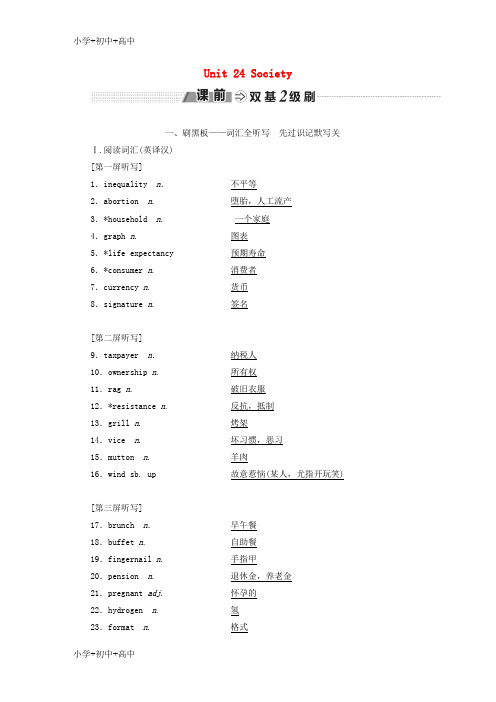
Unit 24 Society一、刷黑板——词汇全听写先过识记默写关Ⅰ.阅读词汇(英译汉)[第一屏听写]1.inequality n.不平等2.abortion n. 堕胎,人工流产3.*household n. 一个家庭4.graph n. 图表5.*life expectancy 预期寿命6.*consumer n. 消费者7.currency n. 货币8.signature n. 签名[第二屏听写]9.taxpayer n.纳税人10.ownership n. 所有权11.rag n. 破旧衣服12.*resistance n. 反抗,抵制13.grill n. 烤架14.vice n. 坏习惯,恶习15.mutton n. 羊肉16.wind sb. up 故意惹恼(某人,尤指开玩笑)[第三屏听写]17.brunch n.早午餐18.buffet n. 自助餐19.fingernail n. 手指甲20.pension n. 退休金,养老金21.pregnant adj. 怀孕的22.hydrogen n. 氢23.format n. 格式24.*leisure n. 闲暇,空闲25.framework n. 结构,构架[第四屏听写]26.feast n.盛宴,宴会27.surplus n. 盈余,剩余28.sow vt. & vi. 播(种) 29.roundabout n. 环岛,环形交叉路口30.collision n. 相撞31.weed n. 杂草,野草32.fountain n. 喷泉,喷水池33.paddle vi. & vt划水;涉水34.wag vt. 摇摆,摆动[第五屏听写]35.packet n.小盒36.grocer n. 食品杂货商37.league n. 联合会38.ministry n. 部39.poster n. 海报40.edition n. 版本[第六屏听写]41.alley n.胡同,小巷42.rectangular adj. 长方形的43.mop n. 拖把44.fragrant adj. 有香味的45.*preservation n. 维护,保存46.arch n. 拱顶47.container n. 容器[第七屏听写]48.relay vt. 转达;传送49.spoonful n. 一匙之量50.*robbery n. 抢劫51.*rape n. 强奸52.*shoplifting n. 在商店盗窃53.*penalty n. 刑罚,惩罚54.*revenge n. 复仇,报复[第八屏听写]55.anchor n.锚56.*seaweed n. 海草,海藻57.swing vi. 摇动58.seagull n. 海鸥59.spiritual adj. 宗教的,教会的;精神的60.prayer n. 祈祷,祷告61.merchant n. 商人[第九屏听写]62.wax n.蜡63.pan n. 锅,平底锅64.semicircle n. 半圆(形)65.suck vt. 含在嘴里吮食66.bare adj. 赤裸的67.*utopia n. 乌托邦,理想中的完美社会68.Buddhism n. 佛教Ⅱ.高频词汇(汉译英)[第十屏听写]1.homelessness n.无家可归2.voluntary adj. 自愿的3.abundant adj. 大量的4.deposit vt. & vi. 存储,储蓄5.govern vt. 统治,管理6.accumulate v. 积累7.burden n. 重担,负担8.diverse_adj. 各种各样的9.come_into_being 形成,存在[第十一屏听写]10.adjustment n.调整,调节11.resign vt. & vi. 辞职12.delete vt. 删除13.shrink vi. (使)收缩,缩小14.show_off 炫耀,夸耀15.elect vt. 选举,推选16.merciful adj. 宽大的,仁慈的17.knock_into_sb. 撞上某人18.turning_point_ 转折点[第十二屏听写]19.undertake vt. 着手做,从事20.squeeze vt. 挤21.thirst n. 口渴22.break_into_ 闯入23.fine n. 罚款24.sentence n. 判决25.abolish vt. 废除26.on_principle_ 根据原则27.sentence_sb._to_death 判某人死刑[第十三屏听写]28.*furthermore adv. 此外,而且29.consequently adv. 所以,因此30.vacant adj. 未住人的,空置的31.choke vi. 窒息,噎住32.virtue n. 优点,长处33.rot vt. & vi. 腐烂34.skip vt. 跳过35.cast vt. 投下36.*moreover adv. 再者,此外二、刷清单——热身自盘点再过基本应用关(一)核心单词(四)初中考点再回顾一、过重点单词——纵引横联超人一点1.burden n .负担,重担 vt .(使)担负(沉重或艰难的任务、职责等)[教材原句] Instead, they feel like a burden because every month we have to hand over most of the money we earn to pay for them.相反,它们就像一种负担,因为我们每月都要将挣来的大部分钱拿出来支付贷款。
北师大版高中英语选修八unit 24《society》the second period grammar优秀教案(重点资料).doc

安徽省滁州市第二中学高中英语 Unit 24 Society The SecondPeriod Grammar教案北师大版选修8Teaching goals 教学目标1. Target language 目标语言Learn about the subjunctive mood used for persuasion.2. Ability goals 能力目标Enable students to use the subjunctive mood to talk about problems and give advice.3. Learning ability goals 学能目标By practicing help students to learn to use the subjunctive mood freely.Teaching difficult points 教学难点The subjunctive mood used for persuasion.Teaching important points 教学重点How to use the subjunctive properly in communication.Teaching methods 教学方法Listening and speaking; asking and answering; pair work. Teaching aids 教具准备A multi-computer.Teaching procedures & ways 教学过程及方式Step I RevisionDeal with Exercise 4Check the homework.Ask individual students to read out the sentences they underlined in the text.T: Last period I ask you to do Exercise 4 after class. Now let’s check the answers together. First, please read out the sentences you underlined.Ss: Protest groups are insisting that some of our money be given to the third world.Trade unions demand that the government shorten the working week.They are also suggesting that people should share work.It’s high time that we took these issues more seriously.We ought to visit the shops less.Step II GrammarGet the students to learn to use the subjunctive correctly. Deal with Exercise 5.Read the instructions and check that students understand what to do. Students do the exercise. Work in pairs, reading the sentences and doing the matching exercise.After that, let students read the Grammar Summary 5, page 102. Then show the following on the PowerPoint.T: The subjunctive mood is very common in formal writing and in speech, and particularly after verbs such as demand, insist, recommend, suggest, and wish, nouns and adjectives such as demand, essential, important, insistence, proposal, suggestion; and conjunctions such as although, as if, as though, if and unless. In this unit, we mainly learn about these complex sentences: (1) suggest, advise, recommend, propose, order, command, request, require, demand + that clause (should do/do )He suggested that we (should) save money for the future. (insist 根据判断)(2) It is suggested/advised/ordered/requested/required + that-clause(should do/do) (主语从句)(3) My advice/suggestion/request/requirement is + that-clause (should do /do) (表语从句)His suggestion/advice/request/requirement + that-clause(should do/do ) is…(同位语从句)(4) It is natural/necessary/strange + that-clause (should do/do) 表惊奇、怀疑、惋惜、不满、理应如此等。
- 1、下载文档前请自行甄别文档内容的完整性,平台不提供额外的编辑、内容补充、找答案等附加服务。
- 2、"仅部分预览"的文档,不可在线预览部分如存在完整性等问题,可反馈申请退款(可完整预览的文档不适用该条件!)。
- 3、如文档侵犯您的权益,请联系客服反馈,我们会尽快为您处理(人工客服工作时间:9:00-18:30)。
[话题素材]
好词
1.encourage v. 鼓励
2.medical adj. 医疗的
3.depressed adj. 沮丧的
4.spare v. 抽出
5.urgent adj. 紧急的
6.represent v. 代表
7.remind sb. of sth. 使某人想起某事8.show respect to 对……表示尊敬
9.treat sb. as 把某人看作
10.support a family 养家
11.participate in 参加
12.make a contribution to 对……做出贡献
13.have a sense of humor 有幽默感
14.build_up trust 建立信任
15.benefit from 从……中获益
佳句
1.They need for an increase in numbers of surgeons so_that patients may be treated as soon as possible.
需要增加外科医生的人数,以便患者能够及早得到救治。
2.As_we_know,_they differ with you on this subject.
据我们所知,他们同你在这个问题上是有分歧的。
[精美语篇]
Work hard and be thrifty
First of all,we should work hard and study hard. As we know, hard work can lead to success. If people want to make more money or want to make greater achievements, they must devote themselves to their work. As students, if we want to do well in our studies, we should also spend more time and work hard. Then we can gain more knowledge and improve our abilities so that we can be admitted to good universities and in the future we can find more satisfying jobs.
On the other hand, we should live a thrifty life. Resources should be saved. For example, we should save water, food and electricity. Never waste money. We should also promote waste recycling as possible as we can. As for us senior school students, I think concentrating。
